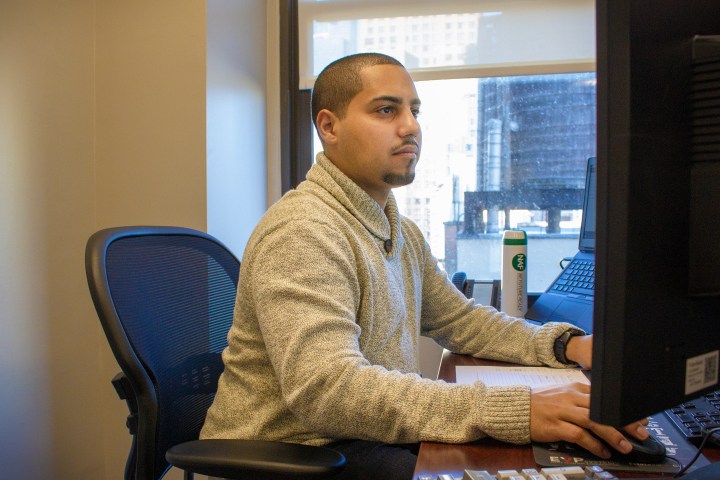
We talked to 10 people who roughly represent the 164 million-person U.S. labor force. Ten stories, one question: “Is the economy working for you?” Meet Michael.
- Name: Michael Durant
- Occupation: Senior accountant, Prager Metis CPAs
- Based in: New York City
- Daily commute: Between 30 and 50 minutes on the subway
- Age: 31
The numbers on Michael:
- Four in 10 people in the labor force over 25 have a bachelor’s degree or higher. Like about 15% of them, Michael also has an advanced degree.
- The Bureau of Labor Statistics would categorize his job under “management, professional, and related occupations,” along with 4 out of 10 U.S. workers. This category also includes teachers, dentists, nurses, architects, CEOs, scientists and a wide range of other professionals.
Michael is a senior accountant in the trusts and estates department at a certified public accounting firm. He still lives in the neighborhood where he grew up, the Bronx. Most of the people in Michael’s family (his grandparents, father, uncle) did manual blue-collar work. That’s how Michael saw his future, too, until his economic destiny was altered by a high school internship with the accounting firm KPMG, exposing him to a career path he hadn’t previously considered. Michael attended Baruch College for both his undergraduate and graduate degrees and these days is pursuing a law degree at night.
What kind of training did you have to do to get the job you have now?
To be a CPA in New York, you need 150 college credits, a bachelor’s degree, plus a few extra courses. Most of the CPA skills are soft skills in communication and critical thinking. People think “accountant” and equate math, but it is more about being able to explain complex topics in a simple and digestible way. Our clients are busy people, and they depend on us to sift through information and give them what they need to make decisions. At the same time, we must understand empathy to be able to guide our clients through some of the toughest decisions they may need to make.
What’s the one tool you can’t do your job without?
Microsoft Excel. This one tool allows me to deal with numbers if I need to create flow charts to see a big picture of the problem at hand, and it also allows me to filter through massive amounts of information with ease.
What’s the hardest part about your job that nobody knows about?
Besides the filing deadlines that most of us are aware of, I would think most people are not aware of how much we study and must know. We work with people across industries, borders and cultures. We must be able to communicate and be knowledgeable about all our clients, no matter where they are located or what industry they are in.
When you were a kid, what job did you think you were going to have when you grew up?
I wanted to be a mechanic. Growing up, my grandfather owned a garage and he worked for himself. It sparked an entrepreneurial spirit in me. Then “The Fast and the Furious” was released and “Pimp My Ride” was on air, these shows/movies made me want to work to build something so powerful and beautiful. I changed focus in junior year of high school when I got my first internship through the National Academy Foundation’s Academy of Finance program. I would one day like to have my own personal garage for a hobby.
What was your first job?
My first real job, at 16, was McDonald’s. I worked two or three afternoons a week and weekends while in school and maintained a full-time schedule when school was not in session.
Click the media players below to hear how Michael’s story evolved:
There’s a lot happening in the world. Through it all, Marketplace is here for you.
You rely on Marketplace to break down the world’s events and tell you how it affects you in a fact-based, approachable way. We rely on your financial support to keep making that possible.
Your donation today powers the independent journalism that you rely on. For just $5/month, you can help sustain Marketplace so we can keep reporting on the things that matter to you.


















